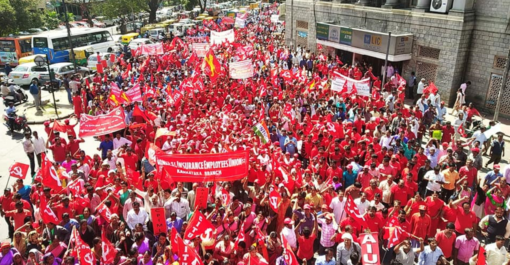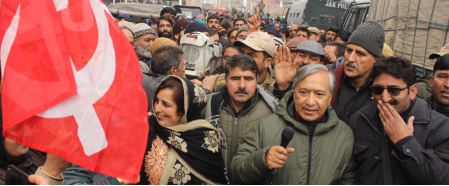
As the working class across the country joined hands with each other, the two-day nationwide strike against the “anti-labour, anti-people and anti-national policies” of the BJP-led Centre drew massive response across the country. More than 20 crore people from organised sector, both public and private, including in multinational companies, scheme workers and the unorganised sector took to the streets demanding fair wages and their rights. The two-day strike, being term as one of the biggest in recent years, has been called by 10 central trade unions.
The second day of the strike saw joint trade union rallies in every state capital and even in district centres across the country. In the national capital, Delhi, workers, students and youth marched from Mandi House to Parliament Street, raising their 12-point charter of demands. The charter of demands seeks minimum wage of Rs 18,000/month, social security for all workers among others with others. Farmers, agricultural workers, students and youth along with other sections of the society joined in solidarity with the striking workers.

The two-day strike was marked by rallies, dharnas, human chains, rasta roko protests, rail roko protests, torchlight processions at night and even people’s poetry recital before the collectorate in Maharashtra.
The banking and insurance sector came to a standstill all across the country during the strike. As per a statement by the AIBEA, cheques worth Rs 20,000 crore were not cleared due to the strike. Electricity generation and distribution, coal extraction and movement, non-coal mining, iron ore mining and steel production, got affected since the workers actively responded to the strike call. Oil extraction, refining and marketing, along with LPG in entire Eastern and Northern sector was completely paralysed. Even supply of aviation fuel was affected, resulting in cancellation of many flights. Transport sector, including road and rail, was affected resulting in cancellation of many trains. Railway workers and defence sector employees joined in solidarity everywhere.
BEST, Mumbai city road transport service provided by the Municipal Corporation, recorded complete close down. Employees and teachers in Delhi University and teachers and students of Jawahar Lal Nehru University have also joined in solidarity striking work.
Kerala, Assam, Odisha, Puducherry, Manipur and Meghalaya witnessed a complete shutdown during the strike. While Goa and Bihar, which were on industrial strike on January 8, experienced a bandh-like situation during the second day. The district centres in Andhra Pradesh, Telangana, Karnataka and Madhya Pradesh were impacted.
Industrial areas in and around Delhi NCR region came to a grinding halt as workers went on strike. Multinational companies such as Coca Cola, Toyota, Volvo, Samsonite, Crompton, CEAT etc saw a complete shutdown.
Like the first day of strike, normal life across Kerala was hit on the second day, too. State-owned private buses and contract vehicles remained off the roads but pilgrims to the Sabarimala shrine were allowed to proceed from all places. Though private vehicles were seen plying across the state, autorickshaws remained off roads. While banks were shut, attendances in state and central government offices marginally low. All university examinations slated for Wednesday in Kerala were postponed and educational institutions were closed. There were also reports of rail and road blockades from several parts of the state.
In Tamil Nadu, a highly industrialised state, huge demonstrations were conducted in many pockets. Unions from various sectors like transport, postal, banking, IT, etc participated in the strike. Many students and youth organisations also came out in solidarity with the striking workers ..
“About 25 lakh workers from different fields are on strike,” said G Sukumaran, state secretary of Centre of Indian Trade Unions (CITU) while talking to Newsclick. “About 16% of state revenue if affected by this. Half of public transport is not working. Fee counters of electricity board are closed down,” he added.
In Perambur city, neighbouring Chennai, about 500 people gathered for a train-stopping demonstration. As a huge number of police were present, the workers had a scuffle outside the railway station but some 50 workers pushed their way through the police and barricade and stopped two electric trains.
“Huge demonstrations happened in places like Coimbatore and Tirupur,” said Sukumaran. “On the first day of strike, Pondicherry stood still in all fields. It was a partial bandh in Tirupur and Coimbatore also. Industrial belts in the state witnesses a very impressive participation by the workers. This is not a warning bell for the central government alone. The AIADMK government of Tamil Nadu is not at all active. The state is doing whatever the centre ask them to without raising any questions. People are very frustrated and that is being reflected in the participation in this strike.”
In Goa, private bus operators stayed off roads across the state. John Nazareth, President of the Goa Government Employees Association, said government servants reported to work, because the Association only "morally supported" the strike, but did not participate in the same.
The strike remained largely effective across various parts of West barring a few sporadic incidents of vandalism. Train services were briefly affected on the Sealdah-Lakshmikantapur Namkhana and Diamond Harbour sections of Eastern Railway as strike supporters threw banana leaves on overhead wires. On Tuesday, many Left activists, including CPI(M) leader Sujan Chakraborty, were detained while picketing in Jadavpur. Throughout the strike, trade unionists, protesting workers and Left activists were under attack by the police under the Trinamool Congress (TMC) government, with the help of TMC members.
Apart from West Bengal, reports of arrests of striking workers in Assam and Jharkhand, slapping of ESMA and No Work No Pay notices, break in service threats, dismissals of junior workers etc. in various states. The striking workers of Daikin were also been attacked by the company’s bouncers in Neemrana. Similar attacks took place in Alwar in Rajasthan.
In Odisha, the strike disrupted normal life. Train services in Bhubaneswar, Balasore, Berhampur, Cuttack and many other places were obstructed. The protesters also staged picketing at various public sector undertakings and offices. Schools, colleges and universities in several districts remained closed in view of the strike. "Our strike has been successful on its second day. We are protesting the anti-labour policies of Narendra Modi government and the people are supporting our cause," said Sauribandhu Kar, state General Secretary of All India Trade Union Congress.
At Lal Chowk in Srinagar, hundreds of activists of various unions across Kashmir associated with CITU thronged to stage a protest in support of the general strike, headed by CPI(M) leader Yousuf Targami.

The protest was attended by the trade union activists from Anganwadi workers/helpers Union, ASHA workers Union, Non-Gazetted Power Development Department Employees Union, Kashmir Construction Workers Union, Horticulture Employees Union, Mid-Day Meal Workers Union, Handicrafts Workers Union, Centaur Hotel Workers Union, Northern Zone Insurance Employees Association.
In Karnataka, more than 50 lakh workers participated in protests, according to the unions. IT sector employees too joined a mass rally in Bengaluru. However, on Tuesday, an anganwadi worker- Shanghai Basavanappa Chakrasali- collapsed and died at the protest site in North Karnataka’s Mundagod town.
In Telangana, more than 20 lakh workers from both organised and unorganised sectors across Telangana participated in the strike. In capital Hyderabad, auto drivers, private transport workers, hospital workers among others have joined the protest rallies. In Districts like Rangareddy, Medak, Sangareddy, Medchal, Bhuvangiri, Nalgonda and Mahaboobnagar, workers in private sector industries were on strike and joined protest gatherings. Like many other state, striking workers and trade unionists have been tageted by the state police. The police arrested several unions' leaders including CITU state President Chukka Ramulu.
Andhra Pradesh has also witnessed workers forming human chains in front of all the government offices in the state.
(With inputs from Zubair Sofi and Nileena SB)




